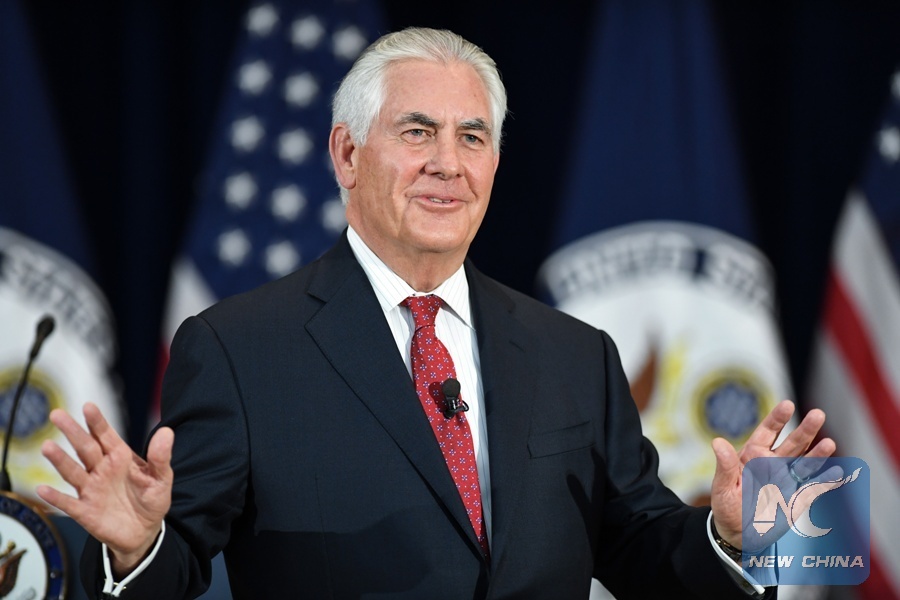
U.S. State Secretary Rex Tillerson delivers a speech to State Department employees in Washington D.C., capital of the United States, May 3, 2017. (Xinhua/Bao Dandan)
WASHINGTON, Aug. 1 (Xinhua) -- U.S. Secretary of State Rex Tillerson said Tuesday that the United States does not blame China for the Korean Peninsula nuclear conundrum.
Speaking here at a briefing, Tillerson said that to achieve the goal of denuclearization on the Korean Peninsula, the United States seeks to "partner with China," and that the United States doesn't blame the Chinese for the situation on the Korean Peninsula.
But days ago, Trump baselessly linked in his latest tweets the U.S. trade deficit with China to the situation on the Korean Peninsula, saying, "I am very disappointed in China. Our foolish past leaders have allowed them to make hundreds of billions of dollars a year in trade, yet they do NOTHING for us with North Korea, just talk."
Tillerson also said that the United States would like to have a dialogue with the Democratic People's Republic of Korea (DPRK) at some point.
"We are not your enemy ... but you are presenting an unacceptable threat to us, and we have to respond," said Tillerson. "We hope that at some point they will begin to understand that and we would like to sit and have a dialogue with them."
Tillerson also reiterated that the United States seeks neither a "regime change" nor "collapse of the regime" in the DPRK.
"We do not seek an accelerated reunification of the peninsula," Tillerson said. "We do not seek an excuse to send our military north of the 38th Parallel."
Tillerson's remarks came days after the DPRK launched its second intercontinental ballistic missile (ICBM) in a month.
The DPRK on Saturday confirmed the test-firing of a second ICBM simulating its maximum range, which it said can cover all the territories of the United States.
"The second test-fire of the ICBM Hwasong-14 was successfully carried out at night of July 28, 2017, under the supervision of (DPRK top leader) Kim Jong Un, who guided the test-fire on the spot," the Korean Central News Agency said in a report.
The missile traveled about 1,000 km before splashing down into the sea, said Pentagon spokesman Jeff Davis in an early statement.
This is the second time for the DPRK to have successfully launched its ICBMs, the first being launched on July 4.
China has always called for negotiated solutions to the nuclear issue on the Korean Peninsula.
Liu Jieyi, China's permanent representative to the UN, said on Monday that China is firmly opposed to any violation of the UN Security Council (UNSC) resolutions, including nuclear tests and ballistic missile tests by the DPRK.
China has been urging the DPRK and other relevant countries not to exacerbate the situation on the Korean Peninsula by avoiding words and actions that could escalate regional tensions, which run counter to the objectives sought by the UNSC.
China has been working with Russia to put forth a road map for achieving regional peace and the UNSC's objectives, the Chinese ambassador told a press conference at the United Nations.

